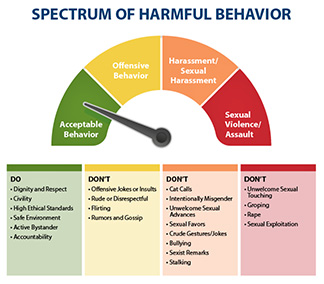As we settle into our summer routines, splashing around at pools and sipping on lemonade, it is important for Veterans and VA employees to remember to stay safe. Summer months can be fun, but historically they have also led to a higher rate of sexual assault.
A report issued by the Department of Justice noted that the rates of rape and sexual assault in the summer, on average, were 9% higher than in winter and 10% higher than in fall.
 Tips for summer safety
Tips for summer safety
- Stick together. Be sure to have at least one friend with you, especially if you are walking.
- Stay alert. Whether you are at a bar, celebrating at a public party, or walking home, stay aware of your surroundings and who is around you.
- Report suspicious activity. If you notice a person who makes you feel unsafe or who is exhibiting inappropriate behavior, get out of the environment safely and as soon as you can. You should report the behavior as soon as possible to the proper authorities and stay on the phone until you are in a safe environment.
- Look out for others. Learn and implement intervention techniques that enable you to safely intervene if you witness someone being harassed.
While these tips are focused on avoiding or reducing risks posed by strangers, most sexual assaults are committed by someone who the person assaulted knows, so it is important to stay alert for concerns within intimate partner, dating and friend relationships.
Learn how to help
Bystander intervention strategies help you to recognize and respond safely to a situation that is potentially hostile or to a behavior that may be harassing so that the situation does not get worse.
VA’s bystander intervention training describes these easy-to-remember steps:
- Be Direct: Address the harasser with a short statement or question to point out threatening or inappropriate behavior in a safe, respectful manner.
- Distract the assailant: Use a subtle and creative way to draw away or divert attention. Directly engage the person being harassed without getting involved with the harasser or referring to the harassment. Instead, talk about something completely unrelated.
- Delegate to someone nearby: Ask for help. Seek the assistance of a security guard or law enforcement in the vicinity of the incident.
- Document the details: Capture the who, what, when and where to ensure your report to the proper authorities leads to appropriate action.
Watch this 1-minute video for more information or take VA’s free, online 30-minute bystander intervention training.
Recognize Harassment and Sexual Assault
“Sexual assault is, at its core, a devastating abuse of power,” VA Secretary Denis McDonough said. “Little can destroy institutional trust faster and more painfully than sexual harassment or assault, and I won’t tolerate it.”
While some acts are clearly recognizable, other harmful behaviors are less obvious. This gauge provides examples of behaviors that can have an adverse impact on the physical and mental health of those who experience them. If you experience harassment or sexual assault this summer, VA is here to help with a wide variety of resources.
Topics in this story
More Stories
Study underscores important role COVID vaccination can have in protecting Veterans from infection and reducing long-term health consequences
Columbia VA’s robotic surgery teams completed their 800th robotic surgery and are on schedule to hit 1,000 by the end of the year.
In a decentralized clinical trial, Veterans can participate from their own homes or local VA instead of having to travel to a research site.








Please send this information to the director of the PRRC in Buffalo NY as harassment must be unlearned by the old fogies